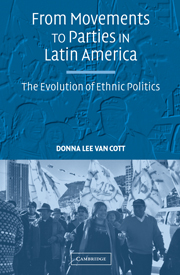Book contents
- Frontmatter
- Contents
- Preface and Acknowledgments
- Abbreviations and Acronyms
- From Movements to Parties in Latin America
- 1 Introduction: Toward a Comprehensive Theory of Ethnic Party Formation and Performance
- 2 Institutions, Party Systems, and Social Movements
- 3 “A Reflection of Our Motley Reality”: Bolivian Indians' Slow Path to Political Representation
- 4 “We Are the Government”: Pachakutik's Rapid Ascent to National Power
- 5 “It Is Not a Priority”: The Failure to Form Viable Ethnic Parties in Peru
- 6 Argentina, Colombia, and Venezuela: Unlikely Cases of Ethnic Party Formation and Success
- 7 Conclusions and Implications
- References
- Index
4 - “We Are the Government”: Pachakutik's Rapid Ascent to National Power
Published online by Cambridge University Press: 04 June 2010
- Frontmatter
- Contents
- Preface and Acknowledgments
- Abbreviations and Acronyms
- From Movements to Parties in Latin America
- 1 Introduction: Toward a Comprehensive Theory of Ethnic Party Formation and Performance
- 2 Institutions, Party Systems, and Social Movements
- 3 “A Reflection of Our Motley Reality”: Bolivian Indians' Slow Path to Political Representation
- 4 “We Are the Government”: Pachakutik's Rapid Ascent to National Power
- 5 “It Is Not a Priority”: The Failure to Form Viable Ethnic Parties in Peru
- 6 Argentina, Colombia, and Venezuela: Unlikely Cases of Ethnic Party Formation and Success
- 7 Conclusions and Implications
- References
- Index
Summary
The PSP–Pachakutik alliance will permit an era of transition, of changes that the indigenous movement plans to make. We are going to establish the bases of our project. The perspective is to construct a Plurinational State, which permits the exercise of the rights of everyone.
Luis Macas, Pachakutik, Minister of Agriculture, 2003The Ecuadorian case has received considerable scholarly attention because of the meteoric rise of the indigenous-movement–based party Movimiento de Unidad Plurinacional Pachakutik (Pachakutik or MUPP). The party has been an important national actor since its first election in 1996. It helped elect President Lucio Gutiérrez in November 2002 in an alliance that garnered five Pachakutik militants seats in the cabinet. Pachakutik was formed by one of Latin America's most effective and internationally renowned indigenous peoples' organizations, CONAIE.
The Ecuadorian case emphasizes the importance of organizational unity and the existence of a dense network of affiliates to compensate for the absence of material resources. Despite the existence of numerous internal conflicts, based in regional, ethnic, religious, and personal rivalries, Ecuador's indigenous movement as a whole mobilized as a coherent collective actor during moments of crisis and opportunity. Both CONAIE and Pachakutik fended off challenges from rival organizations and harnessed the support of at least 80 percent of the indigenous population, while forging ties to sympathetic social organizations and political elites. But it wasn't easy. Significant attention is paid in this chapter to the fragile relationship between movement and party, which has reduced the electoral potential of the latter.
- Type
- Chapter
- Information
- From Movements to Parties in Latin AmericaThe Evolution of Ethnic Politics, pp. 99 - 139Publisher: Cambridge University PressPrint publication year: 2005
- 1
- Cited by



